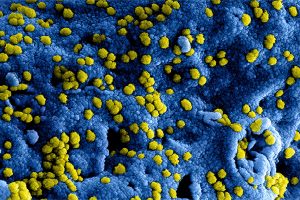Zoloft (sertraline) is a common medication used to treat panic attacks, obsessive-compulsive disorder (OCD), social anxiety disorder, post-traumatic stress disorder, and premenstrual syndrome. However, among its many uses, it’s perhaps most commonly used as an antidepressant. This article will tackle the relationship between Zoloft and acne. In doing so, it will answer questions such as: does Zoloft cause acne? How does one treat Zoloft-induced acne? What are the pros and cons of using Zoloft?
Through this, potential consumers can have a deeper and more informed understanding of this medication and how it can affect them in the long run.
Acne and Zoloft
Some people might think there’s no direct relationship between taking antidepressants and acne. But in actuality, there is. The way it happens can be considered somewhat paradoxical.
When you experience depression or anxiety and decide not to take any medication to treat it or change your lifestyle to relieve some of the symptoms, your cortisol and hormone levels can be affected.
Often, some people’s skins reflect these effects. For example, stress causes inflammation, which can lead to conditions such as irritation, redness, or eczema.
Anxiety and depression can have other physical effects, such as dry skin. Whether that appears as acne or psoriasis, these conditions often reduce the skin’s overall glow and luster. In addition, mental health challenges can sometimes cause existing skin problems to flare up.
One way to treat these conditions is to start taking medications. Unfortunately, one of the possible adverse effects of these drugs is acne.
Does Zoloft Cause Acne?
As with any medicine, some risks and potential side effects are associated with taking Zoloft. One of these risks is developing acne.
As a type of selective serotonin reuptake inhibitor (SSRI) used to treat various mental illnesses, this type of medication can increase the level of serotonin in the brain to reverse the effects of depression and other mental disorders. However, this medicine can also impact the skin cells of some patients — in particular, their oil production.
People with oily skin tend to have more acne and breakout problems than other skin types. But when they introduce SSRIs like Zoloft into their system, they may become more acne-prone than they already are. This is because Zoloft can increase cell production, causing their pores to clog and subsequent breakouts.
Does Zoloft cause acne? While it’s true that Zoloft can cause acne, it’s not necessarily an unavoidable side effect for everyone. Some patients don’t get acne from taking this medication. This is because every person’s body reacts differently to the drug.
How Does Zoloft Cause Acne?
One of the biggest causes of common acne is a change in hormones. This shift in people’s hormonal levels typically occur during a big change in their lives, whether puberty, menopause, pregnancy, or something else.
However, this change can also occur when a patient introduces a new drug into their system, particularly antidepressants.
Numerous studies have shown how antidepressants like Zoloft can affect hormones. While many studies conclude that antidepressants influence estrogen and testosterone levels, how they do so varies. Some findings show that there’s an increase in these hormones. Others show a decrease or no effect at all.
Many researchers attribute conflicting findings to numerous factors, including gender and age. Since depression and anxiety are more common in women than men, it’s important to consider sex as an integral component in how taking Zoloft gives rise to side effects like acne.
Zoloft-induced Acne
By altering hormone levels, Zoloft also modifies the body’s function. For example, while people with oily skin increase their oil production, those with other skin types report drier skin when taking Zoloft.
Other than increasing skin cell production, antidepressants have what’s known as “anticholinergic side effects,” which essentially refers to how they can block the nerves responsible for producing saliva. As a result, you can feel dry skin, especially on your cheeks and lips.
Although it’s clear how excess oil can contribute to acne, few people recognize how dryness can also play a role. Having dry skin prompts the system to produce more oil, which can lead to clogged pores and breakouts.
On top of heightened oiliness or dryness, Zoloft can also give rise to excessive sweating, a common side effect. Excessive sweating can wreak havoc on the face, especially the forehead, creating an ideal environment for pimples or spots to thrive.
How To Treat Zoloft-induced Acne
Treating Zoloft-induced acne is different from treating common acne caused by other factors. Changing your lifestyle and skincare routine is the best course in both cases.
Self-care is an essential part of the treatment. When you take care of yourself — that is, by following a healthy diet and regular exercise — you can regulate your cortisol levels and minimize the risk of developing acne.
Likewise, if they develop a good skincare routine, they can mitigate breakouts or the growth of acne on the skin. For example, if you’re experiencing extreme dryness due to the medication, it’s best to incorporate humectants such as hyaluronic acid into your daily routine. In addition, making sure that the face is appropriately moisturized can help reduce overall dryness and lock in hydration for longer.
On the other hand, treating Zoloft-induced acne caused by increased oiliness requires rigorous exfoliation and cleansing. Doing a double cleanse can open up the pores and prevent clogging. Likewise, applying serum can treat pimples and breakouts. Enhancing your skincare routine and lifestyle habits can significantly lessen and treat Zoloft-caused acne.
Who Should Not Use Zoloft?
Despite the safety and effectiveness of Zoloft as an antidepressant, some people should not take it. For example, those taking other medications like pimozide, isocarboxazid, linezolid, phenelzine, selegiline, rasagiline, tranylcypromine, disulfiram, and methylene blue injections. Taking these medications alongside one another can lead to serious health conditions and severe side effects.
Likewise, people taking stimulant medicines like herbal products, opioid prescriptions, and other mental illness medications should avoid taking Zoloft. Letting these medications interact can lead to a serious condition known as serotonin syndrome.
To ensure that the medicine is safe for you, you must inform your doctor if you have ever experienced the following conditions:
- Allergy or sensitivity to sertraline, aspirin, or tartrazine (also known as food dye)
- Heart disease, stroke, or high blood pressure
- Bipolar disorder
- Liver or kidney disease
- Sexual problems
- Seizures
- Bleeding concerns
- Low blood sodium levels
- Glaucoma
- Long QT syndrome
In addition, pregnant women and adolescents with suicidal thoughts should also consult their family or doctor before taking or continuing this drug.
Zoloft Side Effects
Before taking Zoloft, one must consider the possible side effects a person can experience. These can range anywhere from mild to severe.
Some mild and common side effects include acne, headache, nausea, dry mouth, diarrhea, and increased sweating.
In addition, it’s also possible to feel nervousness, restlessness, fatigue, sleepiness, and insomnia. However, in about one or two weeks of taking this medication, these symptoms should subside as the body adjusts to Zoloft.
However, there are some sexual side effects, like problems with orgasms and delays in ejaculation, that may not diminish over time.
Other Serious Side Effects Related to the Use of Zoloft
On top of the common side effects that a person may encounter while taking Zoloft, there may also be a case where they may experience rare or more severe consequences.
Sometimes, a person may have low sodium blood levels, memory problems, angle closure glaucoma, teeth grinding, and serotonin syndrome.
Other serious side effects include:
- Very rigid muscles
- High fever
- Confusion
- Sweating
- Uneven or fast heartbeats
- Feeling of unconsciousness
- Agitation
- Overactive reflexes
- Hallucinations
- Tremors
- Loss of appetite
- Feeling unsteady
- Loss of coordination
- Memory problems
- Trouble concentrating
- Shallow breathing
It’s imperative to seek immediate medical attention when a patient experiences these rare side effects:
- Allergic reaction
- Sudden vision loss
- Tunnel vision
- Blurred vision
- Eye pain
- Swelling
- Seeing halos surrounding lights
- Severe heart symptoms like fluttering in the chest and shortness of breath
- Sudden dizziness
- Lightheadedness
These are not all of the side effects that you may experience. There may be other adverse consequences that are not well-known yet. However, the important thing is to take note of what you’re experiencing while taking medicine. In doing so, you can recognize the effects on your body and make the necessary adjustments.
Other Antidepressants That Can Cause Acne
Unfortunately, Zoloft is not the only antidepressant that can cause acne. There are many drugs prescribed for mental illnesses that can cause acne breakouts. Two of the notable brands are Lexapro and Wellbutrin. These medications treat seasonal affective disorder (SAD) and major depressive disorder (MDD). Some people also use these medications to help them quit smoking.
Patients diagnosed with bipolar disorder often take lithium because it can help them manage their condition better. However, the downside to taking this medication is the possibility of getting acne.
Other medications include citalopram and paroxetine, which can dry one’s skin and decrease the amount of sweat (also known as a rare condition called anhidrosis). While it might seem harmless at first, this process can damage the skin and make it extremely sensitive. The sensitive skin becomes more vulnerable to bacteria build-up that may lead to acne breakouts.
The Pros and Cons of Using Zoloft
Some effects can be expected when taking any medication. Therefore, before you decide if Zoloft is the right choice, you must weigh its pros and cons.
Pros of Taking Zoloft
One of the best pros of taking Zoloft is that it’s incredibly effective and offers fewer side effects than other alternatives. For example, the drowsiness and weakness you may experience are less severe than on other antidepressants. In addition, it can improve cognitive function and kickstart behaviors to fight against depressive episodes more effectively.
Although it’s effective on its own, many believe that taking this medication instead of going to cognitive behavior therapy and lifestyle changes can enhance the results more significantly.
Cons of Taking Zoloft
Getting acne and experiencing some of the side effects of Zoloft are the only disadvantages of taking the drug. When one takes this medication — much like with other SSRIs — they must commit fully. If they decide to stop, symptoms of depression, anxiety, or other mental illnesses may resurface. Of course, this doesn’t happen to everyone and is only case-by-case. Sometimes, people don’t necessarily get depressed. What they feel is a kind of indifference that may make them feel stagnant. That’s why it’s essential to consult with professionals when changes in mood and body occur.
When To See a Doctor
You must seek immediate medical attention when you notice drastic changes in your behavior and bodily functions. However, stopping the drug altogether is not recommended as it may lead to withdrawal and other health conditions. Instead, they must consult a doctor first to determine the best action.
Remember, side effects are to be expected. Only when these effects go out of proportion should you resort to your last option: visit their doctor.
Frequently Asked Questions (FAQs)
For more information on Zoloft, here are some of the most frequently asked questions answered.
As a powerful medicine, Zoloft is a prescription drug. Therefore, it needs to be taken exactly as the doctor prescribed. Patients must follow all the instructions and read the prescription label carefully to avoid complications. Once the body adjusts to the medication over time, the doctor may change the dosage of the drug.
Take note: Zoloft comes in two forms: tablet and liquid (or oral concentrate). The drug’s guidelines may vary depending on what you’re prescribed. You should ask your doctor or pharmacist if you need further medication assistance.
During the first and second weeks of taking the drug, people can expect a change in their sleep, energy, or appetite. While these improvements signify the onset of the effects of the medicine, it doesn’t treat depressive moods as fast. This effect may take anywhere from six to eight weeks. And for some, even longer than that.
It’s possible that Zoloft can cause weight gain, but it’s not very substantial. This medication can lead to a small weight gain (around 1 percent to 1.6 percent) for 6 to 12 months. For example, a person weighing 150 lbs may gain about 1.5 to 2.5 lbs over time.
Changing your eating habits, food choices, meal timing, and portion sizes is an excellent strategy to avoid adding weight. In addition, these modifications compensate for the effects of the drug.
The proper dosage changes depending on the kind and severity of the mental disorder. For example, those using the drug to treat depression may be prescribed an initial dose of 50 mg daily.
People who take the drug to treat panic disorder or post-traumatic stress disorder (PTSD) may be initially prescribed 25 mg a day. After that, the numbers fluctuate over time depending on the effects of this medication on the individual. Sometimes, doctors may prescribe higher doses if an individual doesn’t see the results after some time.
If you reach the maximum dosage or have overdosed, you must call emergency services immediately. Otherwise, you can call a poison control center. In addition, taking the maximum dose can lead to many symptoms, like fainting and severe dizziness, that may impact one’s health and safety.
Zoloft can cause acne for some users, but it’s not the sole culprit. Other lifestyle factors like diet, sleep, and exercise play an integral role in curing or causing acne.
You must follow a low-glycemic diet to eliminate your acne and prevent future breakouts. This can eliminate the spikes in blood sugar and minimize inflammation. Likewise, avoid oily and fatty substances that may increase the body’s oil production. These minor alterations can lessen the effects of Zoloft on the skin.





